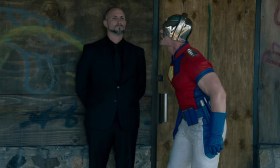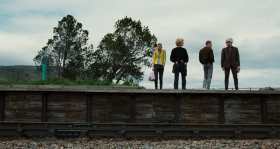By Claudia Sandberg, The University of Melbourne
It all starts when a group of old friends in Buenos Aires meet for a round of the card game truco on a hot summer night. Suddenly – a power outage. As darkness engulfs the city, a mysterious poisonous snow falls from the sky.
Thousands of people die from breathing the contaminated air. All the while, the survivors must use everything at their disposal to fight an invisible enemy.
It hasn’t even been one month since Argentine sci-fi The Eternaut, or El Eternauta, premiered on Netflix – yet it has gripped Argentine fans with a full-fledged fever.
The series is based on Héctor Germán Oesterheld’s iconic 1950s comic of the same name. With the slogan ‘no one survives alone’, the new Netflix series has sparked important conversations, both online and offline, among the Argentine media and public.
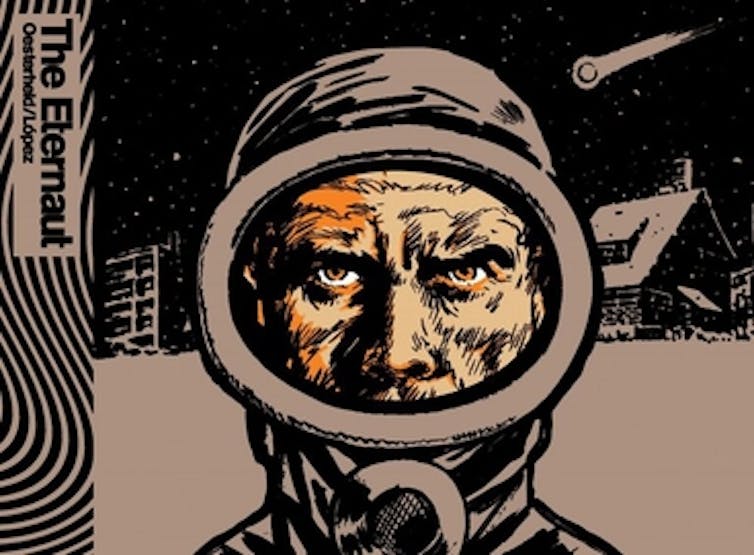
Most importantly, it has fuelled protests against austerity politics and breathed new life into longstanding demands for social justice.
Eternaut: powerful TV for trying times
Argentina is going through difficult times. The country has experienced a sharp rise in poverty in recent years, with an inflation rate that neared 300% at one point in 2024.
Radical spending cuts and privatisation imposed by President Javier Milei’s right-wing government have severely curtailed the budget for cultural spaces.
Milei has all but destroyed the National Institute of Cinema and Audiovisual Arts (INCAA), which previously funded much of the country’s film and audiovisual production.
Then came The Eternaut, a series made exclusively by an Argentine cast and crew, and led by the face of Argentine cinema, Ricardo Darín, as the main character Juan Salvo – a middle-aged veteran of the 1982 Malvinas/Falklands war.
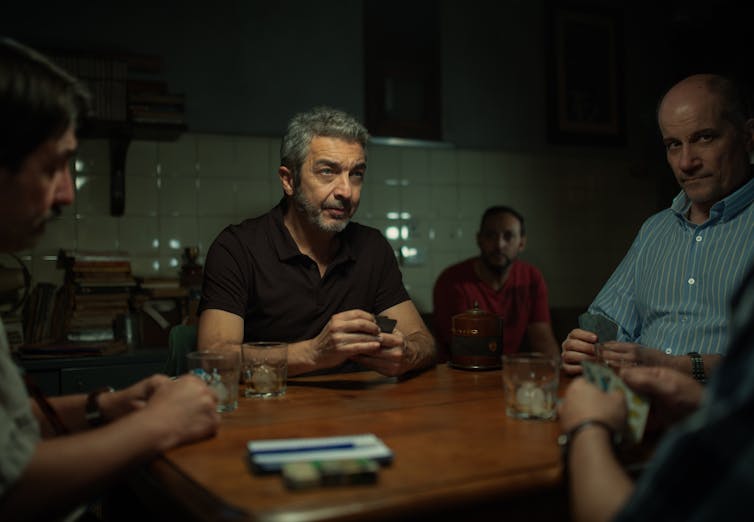
The Eternaut is directed by influential filmmaker Bruno Stagnaro, known for his 1998 crime drama Pizza, Birra, Faso (Pizza, Beer and Cigarettes). This film is credited as the founding text of New Argentine Cinema: a low-budget-style of filmmaking that critiqued class boundaries and social marginalisation.
Almost 30 years later, Stagnaro has turned Hollywood’s safest moneymaking machine – science fiction – on its head. Not with a superhuman star who arrives in a spaceship to save the world alone, but with an Argentine vision of collective heroism, that doesn’t rely on flashy new tech: ‘the old things work, Juan!‘
The show is currently Netflix’s top non-English series in 24 countries. A second season is on the way.
Eternaut: an ode to Argentina
Blending fiction with political allegory, The Eternaut comments on the ongoing trauma of the 1970s dictatorship. It also implicitly criticises the current government’s uncompromising neoliberal approach. For example, it features advertisements, brand logos and other symbols of consumerism which appear absurd in the context of the unfolding catastrophe.
Most of all, the series celebrates Argentine identity through its themes of community spirit, grassroots resistance, and ingenuity in times of crisis. And this has struck a chord with many.
As Ricardo Darín explained in a recent interview:
[The series] examines human behaviour in the face of crisis, dilemma, and catastrophe, but it also highlights — highlights and underscores — the attitudes of those who dedicate their lives to protecting others.
The locals of Buenos Aires would also appreciate seeing their real neighbourhoods onscreen, rather than some romanticised version of their city.
Instead of an epic soundtrack, they hear tango, rock and folk tunes from Argentina’s most iconic musicians.
Eternaut: where are Oesterheld’s children?
The Eternaut touches on a deep social wound that never healed.
The character of Juan Salvo became a real-life symbol of artistic and political resistance when author Héctor Germán Oesterheld and his daughters were disappeared by the military in 1977, never to be found.
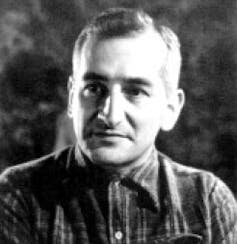
Oesterheld was an outspoken critic of the military junta, led by General Jorge Rafael Videla, that lasted from 1976 to 1983 – the so-called Dirty War. He and his daughters were part of some 30,000 civilians killed or disappeared under the military dictatorship.
Following the 2010 death of former president Néstor Kirchner, a graffito combining the comic book character of Salvo with Kirchner began popping up in black outline all across Buenos Aires.
This image, known as Nestornauta, pays homage to Kirchner – and particularly to his willingness to end impunity for military officers accused of crimes against humanity during the dictatorship.

Juan Salvo’s image is now appearing once again on posters held up in the capital’s Plaza de Mayo, where the abuelas (grandmothers) of Plaza de Mayo – a local human rights organisation – are gathering to demand answers about Argentina’s missing children and grandchildren.
The show has also renewed interest in investigating the disappearance of Oesterheld’s family.
Alejandro Areal Vélez, a filmmaker and architect who participated in a Netflix-organised event for the series, explained how its ripple effect was being felt by locals:
I watched the series in constant tension […] A few days later, I understood: I had seen an analogy with the reality that surrounds me. A city that is the same, yet unrecognisable, while ordinary men try to resist, suffer defeats, and achieve small victories.
The author would like to acknowledge Alejandro Areal Vélez for his on-the-ground research, as well as Katia Troncoso Muñoz for detailed insights into Argentina’s political and cultural contexts.
Claudia Sandberg, Senior Lecturer, Technology in Culture and Society, The University of Melbourne
This article is republished from The Conversation under a Creative Commons license. Read the original article.

